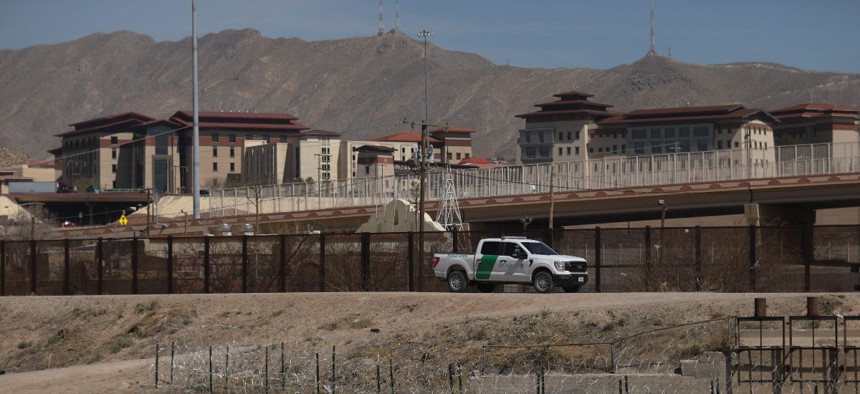
National Guard agents place a barbed wire wall on the banks of the Rio Grande in El Paso, Texas, on the border with Ciudad Juarez, Chihuahua State, Mexico in March. HERIKA MARTINEZ/AFP via Getty Images
HHS Failed to Screen All Employees Working at Shelters for Migrant Children
The Biden administration ignored its own background check policies as it struggled to handle a 700% increase in unaccompanied children arriving at the border.
The Biden administration failed to ensure individuals responsible for caring for migrant children in U.S. custody did not have criminal records, according to a new report, which found the failure could have placed the minors at risk.
In a sample of 229 employees working at “emergency intake sites” the Health and Human Services Department stood up in early 2021 after the number of unaccompanied children arriving at the border spiked, the agency’s inspector general found no evidence that 36 individuals received a background check at all. An additional 174 did not receive their required FBI fingerprint review. HHS did not conduct any background checks for its transportation services contractors, circumventing established policy. The department issued guidance to its contracting officers and the companies that stood up the facilities, the IG said, but poor communication about the requirements and various waivers led to widespread confusion.
“The failure of some facilities and [the HHS Office of Refugee Resettlement] to ensure that required background checks were conducted in compliance with federal regulations or [resettlement office] guidance could have placed the safety of children at risk,” the IG said.
The emergency sites were stood up as a temporary measure to accept children transferred from the Homeland Security Department to ensure they were safely processed and cared for, and, eventually, released to a vetted sponsor or a longer-term care facility. By law, unaccompanied immigrant children must be transferred to HHS custody within 72 hours after Customs and Border Protection personnel detain and process them at the border.
HHS only stands up the emergency shelters when there is a “severe shortage” of beds in its existing network. The temporary sites are not state-licensed but must still provide “basic standards of care” and access to certain medical and legal services. Unlike normal shelters, they are merely encouraged—but not required—to provide case management services, educational activities and recreational time. In fiscal 2020, pandemic-era policy led to just 15,000 unaccompanied children being processed through HHS. In fiscal 2021, that climbed to 124,000, a 700% increase that well exceeded even normal arrival numbers.
HHS clarified in an April 2021 memorandum that no employee or contractor could have unsupervised contact with a child until all appropriate background checks were completed. For front-line employees, that was to include a public records review prior to starting in their roles and, subsequently, FBI fingerprint checks as well. HHS provided waivers to a select few sites to remove the FBI fingerprint requirements to make the process move more quickly, but the public record checks were required in all cases.
Despite the requirements, 27% of those who did eventually receive a background check were already working when the results were processed. In some cases, those employees were directly supervising children for more than two months. No FBI fingerprint checks were recorded for more than 75% of employees. While HHS said that due to the emergency nature of the shelters it did not expect contractors to conduct “child abuse and neglect” reviews that examine state records for problematic histories, the IG found they did so for just 13% of employees.
HHS did not follow up to ensure required background checks were conducted, the IG said, despite the agency contracting with “several organizations that had little or no experience in providing shelter and services to children.”
Every facility the IG reviewed had instances in which employee background checks were not conducted in a timely manner, or at all. The checks were conducted on federal employees who volunteered to deploy to the sites to assist with processing.
The IG conducted public record reviews for a sample of 29 individuals employed by HHS’ transportation contractor who had direct contact with children but for whom no review was ever previously completed and found eight of the employees had criminal records. Only one of those convictions would have required additional review for clearance to be around children. The IG also noted some instances in which its public record reviews yielded different results than HHS’ contractors reported.
The auditors also faulted HHS for failing to maintain proper security at the facilities. Its investigators were able to, at times, gain access without having to show the normally required credentials.
“[The HHS office] must address the shortcomings we identified to ensure that similar issues do not recur during future influxes,” the IG said. “Effective oversight of facility operations and clearly communicating background check requirements are critical to ensuring the safety of children.”
The IG recommended HHS establish better oversight to ensure that going forward all emergency sites complete the required background checks and that any employee waiting on one is denied access to children. It said the department should clarify who gets which reviews and ensure that waivers are actually required before issuing them. HHS should strengthen language in its contracts to make clear the contractors’ responsibilities regarding background investigations, the IG said, and rely less on public record reviews and more on FBI and state-level checks.
HHS agreed with all of the recommendations, but noted it has already taken several steps to prevent a similar outcome should emergency shelters be required in the future. It reissued a memo to make clear when background checks are required and for whom, has beefed up its contract language and established a Background Check, Badging and Security Team.







